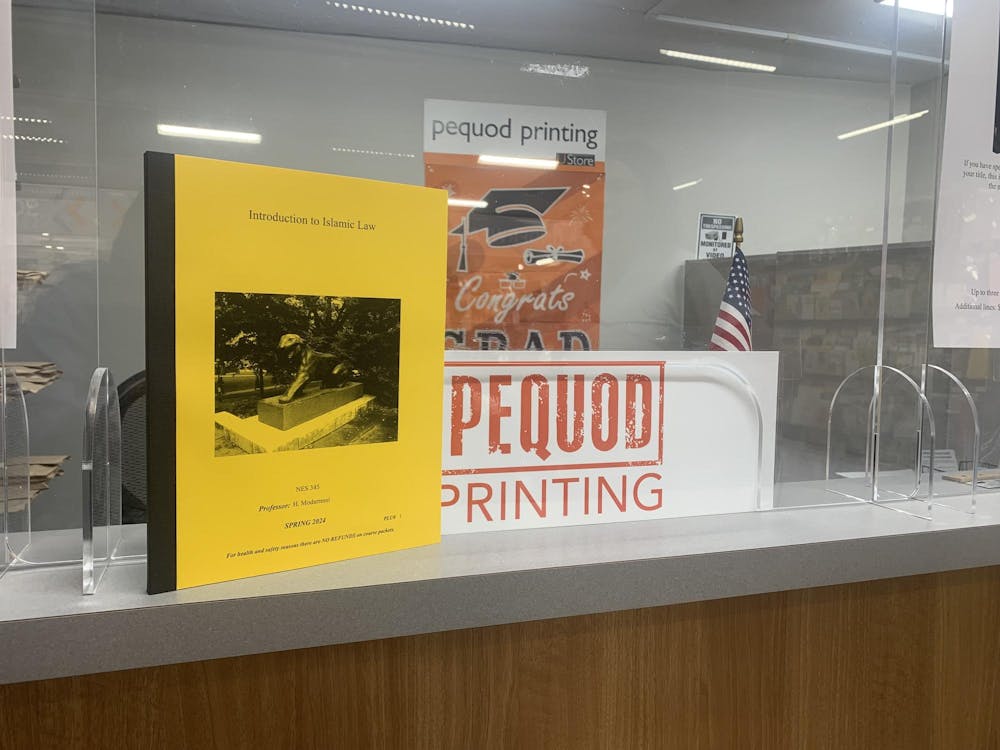As the end of the semester approaches, so too do I approach the end of my University-allotted printing quota. This is a testament to the hefty reading loads often expected in Princeton classes, much of which is uploaded online. As an iPad-less student who values annotating her readings, this means that I am a frequent patron of the various campus printers. While virtual access to course materials is useful, allowing students to practice diverse study methods at no added cost, the academic advantages of reading on paper — to ourselves and our academic community — are too great to ignore. In recognition of this truth, Princeton should encourage professors to return to disseminating their reading through Pequod course packets.
The Pequod packet has long been a source of annoyance and debate at Princeton, though today’s students who are confronted with an abundance of digital pages might never have known them. Defined by the Daily Princetonian’s Frosh Dictionary as “outrageously expensive photocopied packets of required reading,” they are bound compilations of the many readings a professor might assign for their class and contain scholarly articles, primary sources, and more. They have seen reduced use since the library’s introduction of the Electronic Course Reserve Service in 1998; in 2014, only 11 percent of courses circulated their readings on paper packets.
Since the introduction of digital readings, students have begged their professors to abandon printed products. In 2012, Columnist Zeerak Ahmed ’13 argued that Princeton should be “pushing for freer, easier and faster access to information when and where possible,” including committing to making readings free and digital. Three years later, the ‘Prince’ Editorial Board recommended that professors reduce their reliance on Pequod packets wherever possible, in order to “produce a more efficient and more affordable system for distributing course readings.”
But efficiency has never been the most important quality for which an academic should strive. Indeed, it seems that a reduction in time spent distributing readings has only led to a reduction in time spent on readings and quality of learning as a result. For one, the ability to scroll also enables one to skim at a much speedier rate — in absence of pages to flip, you can run your eyes across every page in no time at all. This leads to lower levels of comprehension: students reading on paper consistently have deeper understandings of their texts.
A 2019 study also found that the ability to associate events or ideas in texts with a physical location allows for a greater ability to recall the development of an argument or story. When one reads tangible paper text, they can better recall the information contained within — and point to the location of various ideas in the text, a key skill for Princeton students engaging in precept discussions.
With the recent news that Labyrinth Books will no longer supply the coursebooks for Princeton classes, we are facing a new era in which all readings will only be accessible by some digital medium, whether that be via Course Reserves or online ordering from faraway publishers. While some may see this as a step in the right direction of modernity, the increasing digitalization of our scholarship hurts our learning.
When students are discussing their readings with said texts physically before them, conversations are often higher quality. This is mainly because the existence of paper texts removes the biggest impediment to good discussion: the distraction of having devices in class. When laptops are open, it’s almost impossible to avoid checking emails, texting friends, and doing anything to avoid paying attention to a topic that might be difficult or uninteresting.
Many professors prefer this mode of teaching — I’ve seen many syllabi direct students to leave their laptops in their backpacks when entering the classroom. Some of my most exciting conversations came from precepts in the HUM sequence, whose syllabus declared that “the use of laptops is not permitted during lectures and precepts.” But this vision is difficult to realize when readings are not provided in print.

Physical readings positively impact the group: higher comprehension leads to better conversations, and conversations are more focused and engaging when students are not able to hide behind a screen. Students who need accommodations should of course be provided with opportunities to complete their readings digitally. This is where the wondrous nature of the Pequod packet comes to full use: it exists in PDF form prior to printing and can be circulated as such when needed.
There are other problems that arise with course packets. They can be expensive, as the cost is determined by the copyright royalties necessary to distribute material — when it is done through course reserves, the library covers royalties without passing costs to the student. But when academic flourishing is at stake, is any cost too great? And there is no reason why the return of the packet must also force a return to ancient standards of financial stress — departments could subsidize Pequods, making the superior medium of learning accessible to all.
To combat a future dystopia in which discussion is stymied by students whose digital skimming does not provide comprehension enough for conversation, and distract from their inability to finish their reading by spending class frantically skimming, we must commit ourselves to conducting readings on paper. This can practically be encouraged with the return of the course packet.
Abigail Rabieh is a junior in the history department from Cambridge, Mass. She recognizes that she is being a stubborn contrarian in advocating for this approach, and would like to thank professors Mull, Kruse, and Cannadine for turning her into one by introducing her to the unwieldy beauty of the course packet. She is the public editor at the ‘Prince’ and can be reached at arabieh[at]princeton.edu.









